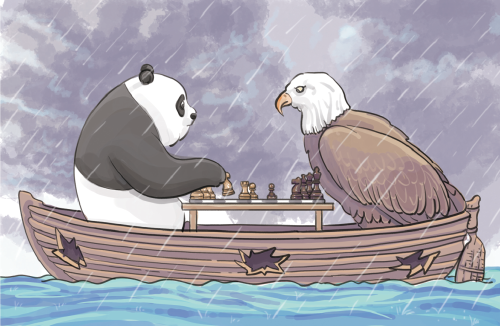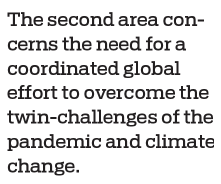Onus on US to avoid another Cold War
One of the best ways to capture the prevailing geopolitical zeitgeist is by pinning down the latest cliché among strategic thinkers. Over the past five years, the term "Thucydides' trap" has come to dominate the discourse about the most consequential bilateral relationship in the 21st century, namely between the United States and China.
The term has been popularized by Harvard political scientist Graham Allison, mainly thanks to his oft-cited Destined for War: Can America and China Escape Thucydides's Trap? (2017).
In his book, Allison essentially argues that the Washington and Beijing are a modern Sparta and Athens, caught in the same hegemonic rivalry that the two ancient Greek city states found themselves in during the destructive Peloponnesian War.
Painting a potentially explosive situation
The two powers are trapped in a potentially explosive situation, Allison argues, whereby "a rising power is threatening to displace a ruling power" and "standard crises that would otherwise be contained "could quickly trigger" a cascade of reactions that, in turn, produce outcomes none of the parties would otherwise have chosen". In short, even seemingly trivial disputes could spiral into full-scale confrontation between the US and China.
The rhetorical fireworks and strategic deadlock at the high-level strategic dialogue in Anchorage, Alaska, last month somehow confirmed the intensity of bilateral tensions between the US and China.
In spite of being led by veteran diplomats, the two sides struggled to even agree on a joint statement, as they sparred over a whole host of hot-button issues with no signs of compromise on the immediate horizon.
Upon close scrutiny, however, it's crystal clear that there are more than enough reasons to avoid a new Cold War in the 21st century. Around the world, there is a profound recognition of not only the necessity of preventing a destructive global conflict, but also forging a new Sino-US "grand bargain", which will facilitate global recovery amid a raging pandemic and a festering climate change.
Coalition of the unwilling
The Cold War was a product of radically different circumstances. It was born out of World War II, which left the US and the Soviet Union victors of a global conflict that devastated much of Western Europe and East Asia.
By the end of World War II, a largely unscathed US dominated close to half of global economic output. The Soviet Union, which suffered as many as 27 million casualties by some estimates, occupied much of Central and Eastern Europe, including parts of Berlin.
Thus, an economically dominant Washington and militarily formidable Moscow were in an unprecedented situation to divide a war-torn world into their own respective spheres of influence.
And to be clear, the Cold War, given the absence of direct conflict between the two nuclear-armed superpowers, was hot and devastating in much of the post-colonial world, where proxy conflicts claimed as many as 20 million lives.
In the 21st century, however, the US is no longer as economically dominant as in the immediate postwar years, nor is China militarily occupying its immediate neighbors. Therefore, neither of the two powers is in a position to dictate the creation of rival military blocs as in the US-led North Atlantic Treaty Organization and the Moscow-led Warsaw Pact.
US cannot force others to break ties with China
Moreover, Western European countries, as well as post-colonial Asian nations are more prosperous and militarily capable than ever. And the traumatic memories of the Cold War has instilled a profound sense of independence among many nations, especially in Asia, which bore the brunt of both the Korean and Vietnam wars.
Crucially, modern China is no Soviet Union, which was an overtly expansionist power with minimal economic footprint beyond its disparate alliances. In contrast, China is the top trading partner of almost all Asian and European countries, and is set to overhaul the global infrastructure landscape through the Belt and Road Initiative.
No wonder practically all Southeast Asian countries, including US treaty allies such as Thailand and the Philippines, are eager to maintain robust ties with China. More important, these countries are also actively resisting any pressure to choose between the two powers.
Across Southeast Asia, as in Eastern Europe, the Middle East, Africa and Latin America, the priority of countless emerging market economies and developing countries is to maintain optimal relations with all major powers. Thus, the US will struggle to enlist much of the world in a prospective new Cold War with China.
It's quite telling that even major Western European countries such as Italy and key Indo-Pacific partners such as New Zealand have defied the US by participating in the China-proposed Belt and Road Initiative. In short, the US will struggle to form a full-fledged anti-China alliance, as it did during the Cold War against the economically weaker Soviet Union.
On the other hand, China's chances of building a counter-US alliance are also not very promising.
It's true that China and Russia were quick to display a common front against Western sanctions on the ashes of the Anchorage dialogue. But despite the deepening bilateral strategic and economic ties in recent years, one cannot discount the element of Sino-Russian competition across former Soviet republics as well as in the global arms market. Not to mention Russia is also dependent on expanding energy exports to NATO member states, especially Germany.
Which means Moscow has an incentive to maintain at least functioning relations with major Western countries, especially in Europe.
China itself has criticized any "Cold War mentality" in favor of rapid economic engagement with much of the world. On its part, even the Joe Biden administration, which has warned of "extreme competition" with the Asian superpower, has acknowledged that it can't even coerce its closest ally into a direct conflict with China.
As US Secretary of State Antony Blinken said in his recent speech before NATO allies, Washington "won't force allies into an 'us-or-them' choice with China", since this seems both impractical and self-defeating.
After all, from Western Europe to Japan and Australia, all major US allies dread a full-scale escalation in Sino-American rivalry, because it could torpedo decades of economic globalization and threaten relative geopolitical stability at both ends of the Eurasian landmass.
A logical way forward, therefore, is for both powers to focus on areas of common interest, including their pivotal role in facilitating the creation of an inclusive, stable and prosperous international order in the 21st century. There are three key areas where the US and China could find a common ground, likely with help of other major powers.
China, US must cowork on global challenges
The first is international trade, whereby the Biden administration can rescind some Donald Trumpera unilateral trade tariffs as well as targeted sanctions, especially those targeted at major Chinese companies, which have disrupted global supply chains threatening economic recovery from the impacts of the COVID-19 pandemic.
In exchange, China can reverse its own retaliatory sanctions, especially those hurting American small business owners and farmers, as well as make certain adjustments in its "Made in China 2025"industrial policy to quell legitimate US concerns over technological theft and zero-sum economic competition.
The second area concerns the need for a coordinated global effort to overcome the twin-challenges of the pandemic and climate change. Instead of engaging in self-defeating "vaccine nationalism" and zero-sum "vaccine diplomacy", the two sides can expand their assistance to the World Health Organization and global vaccine initiatives, especially for developing countries, where new COVID-19 variants have emerged due to delayed mass vaccination.
On the climate change front, the US and China are moving in a promising direction, as both have pledged to achieve carbon neutrality, the US by 2050 and China before 2060. But this should be complemented by joint assistance to climate change mitigation and adaptation initiatives, which will empower the poorest and most vulnerable countries to cope with increasingly frequent extreme weather conditions.
And finally, as the US and China both dramatically expand their naval footprint in Asia's contested waters, they should simultaneously deepen institutionalized dialogue and hotlines among their armed forces, especially their navies and coast guards, which are increasingly active across the South China Sea and the Western Pacific.
With a bit of strategic wisdom, it's more than possible to prevent another destructive Cold War in the 21st century.
Source: chinausfocus.com
The views don't necessarily reflect those of China Daily.


The author is professorial chair holder in geopolitics, Polytechnic University of the Philippines.














